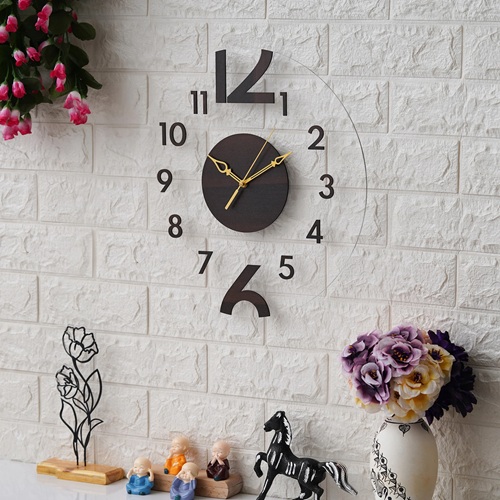According to Vastu, placing a wall clock in the north or east directions attracts wealth and good fortune.
The gentle ticking of a clock carries a distinct rhythm, a subtle reminder of how quickly time passes. Even though smartphones and digital devices have diminished the need for wall clocks, they still remain cherished décor pieces in many homes. Beyond aesthetics, according to Vastu Shastra, the correct placement of a wall clock can influence the energy and harmony within a living space.

Placing the wall clock according to Vastu principles helps maintain positive vibes, invites prosperity, and promotes a sense of well-being. On the other hand, positioning it incorrectly could disturb the energy flow, leading to negative effects.
Let’s explore the best Vastu practices for wall clock placement, ideal designs, and essential dos and don’ts.
In Vastu Shastra, every direction is governed by specific elements and deities, influencing how energies flow within a home. Objects like wall clocks, symbolic of movement and time, are believed to affect this energy significantly.
When placed correctly, a wall clock can:
The north direction is considered the most auspicious for placing a wall clock. Governed by Kubera, placing a clock here is believed to attract wealth, prosperity, and financial growth.
If the north wall is unavailable, the east wall is the next best option. Ruled by Indra, the king of gods, the east direction promotes harmony, success, and good fortune.
Although not as favorable as north or east, the west wall is an acceptable alternative. It is associated with Varun, the lord of rains, and symbolizes stability and emotional balance.
In eastern philosophy, the east is known as the "Orient" and considered highly auspicious. Placing a wall clock on the east side encourages improvement in personal actions and enhances relationships.
For wristwatches, it is best to store or wear them aligned with the north direction to invite prosperity. Avoid keeping watches under your pillow while sleeping, as this can disturb sleep and attract negative energy.
When placing a wall clock in the bedroom, it is recommended to choose the north or east wall. If your bed is positioned with the head pointing south, the clock should be on the north or east wall to maintain harmony. Avoid placing clocks directly opposite the bed or bedroom door. Keep the design simple and ensure it is installed away from the bed to promote peaceful sleep and positivity.
For newlyweds, it is advised to place the wall clock away from the eastern side of the bed.
Simple, elegant wall clocks are the best choice. Round clocks are especially recommended, as the circle symbolizes completeness and positive flow. Avoid irregular or asymmetrical designs.
Select clocks that produce pleasant, melodious sounds. Avoid clocks that emit loud, harsh ticking, as it can disturb the serene atmosphere.
Choose light and auspicious colors depending on the clock’s direction:
Wall clock sizes usually range between 6 to 18 inches. Select a clock that complements the room size — avoid oversized clocks in small rooms to maintain visual balance and positive energy.
According to Vastu, placing a wall clock in the north or east directions attracts wealth and good fortune. North, governed by Kubera, is ideal for financial prosperity, while east, ruled by Indra, supports overall success and well-being. West, associated with stability, can be considered as a secondary option if needed.
Even though the digital age has minimized the utility of traditional clocks, a beautifully placed wall clock can still bring immense aesthetic and energetic value to your home. By following these Vastu principles, you can ensure that this simple piece continues to inspire positivity, growth, and prosperity in your life.